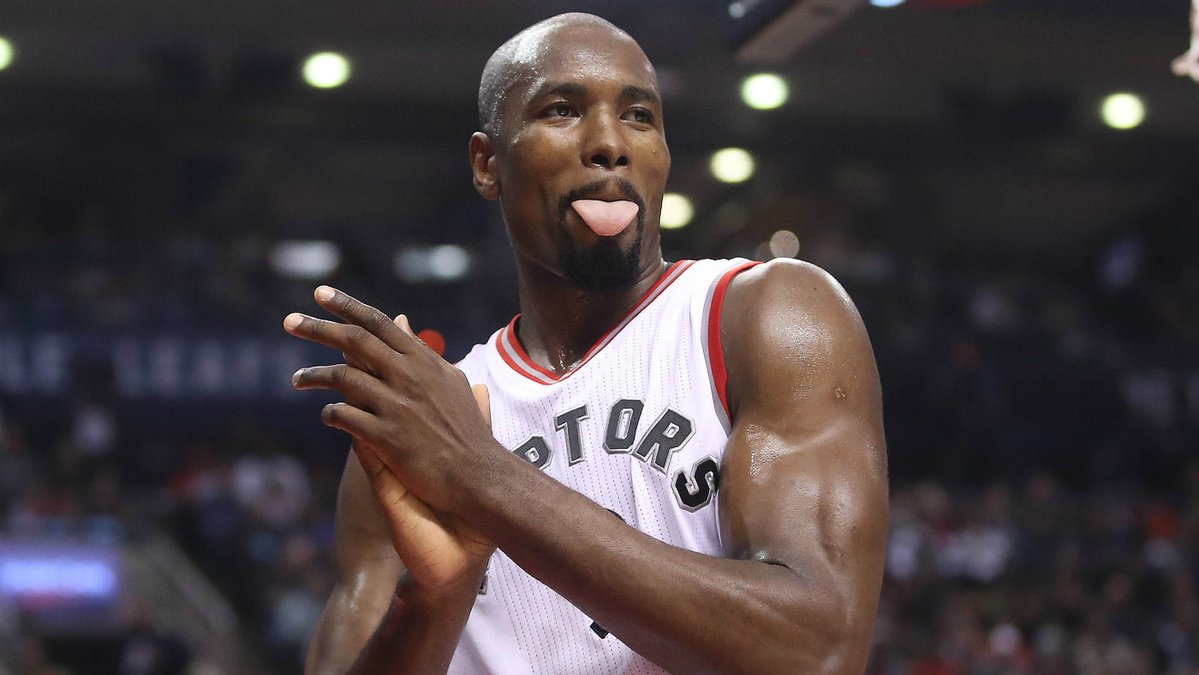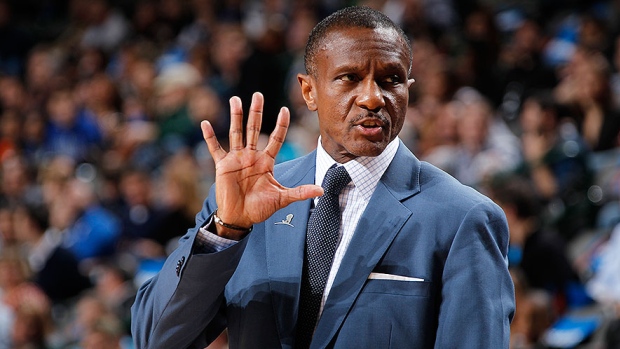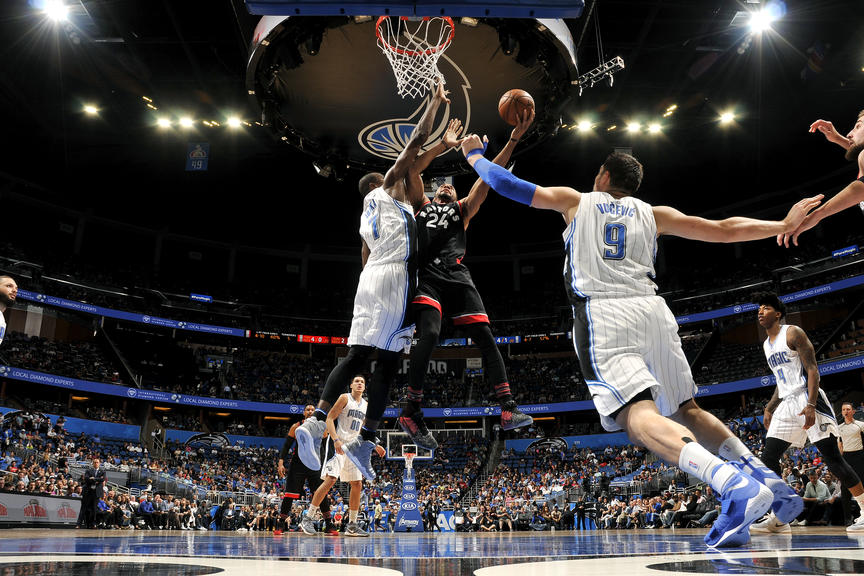Serge Ibaka has recently become somewhat of a whipping boy for Toronto Raptors fans, if the league’s best team could or should have room to receive any criticism. He is often immobile on defence and blown past on the perimeter, but that could easily be chalked up to a lack of interest. When engaged, his defence can be breathtaking. On offence, Ibaka is the team’s least advanced passer, often taking too long on reads, with passing lanes closing before Ibaka makes the pass. His shooting is come and go, and he hunts his own shot perhaps more frequently than any player not named DeRozan. All this is true (maybe, more to come on that), and yet Ibaka is an integral part of Toronto’s title chances. The Raptors are only at their best with Ibaka alongside their stars. Let’s see why.
On offence, the Raptors need someone to finish possessions with a shot, especially when Lowry and DeRozan are double-teamed and draw an entire team’s defensive attention. His assist percentage of 4.0% is incredibly low, even for a big, but that also means he almost never turns the ball over (10.8% turnover rate). As a result, Ibaka takes 41% of his shots from midrange (per CTG), which is high. Lots of Raptors offensive possessions end like this:
And that’s fine some of the time – somebody needs to shoot shots on offence, and Ibaka is relatively efficient despite his antiquated shooting locations. His effective field goal percentage on the season is 55.2%, which isn’t going to blow the doors off of a game, but is enough for the Raptors. When Ibaka is aggressive, hunting shots to make teams pay for doubling DeMar DeRozan, defences have tough choices to make. Do they leave a ~35% 3-point shooter wide open behind the arc, especially after he already hit a jumper or two? Ibaka is making 1.3 open or wide-open 3s on 3.7 attempts per game (35%). When defences fold into themselves to contest a rolling big, a guard’s drive out of the pick and roll, and a shooter behind the arc in the weak-side corner, these are damn good shots:
Are those best or worst case scenarios for the Raptors offence? The starters sure can fill it up. Ibaka provides spacing even if the guard dribbling in the pick and roll does find the rolling big. Valanciunas and Poeltl are both deadly rolling finishers, and if they draw immediate help when they receive the ball lumbering towards the rim. When the help sucks away from the other big, both have the chops to find open shooters on the short roll. Ibaka is massively important in those situations:
Someone on the team needs to make those shots in the playoffs. Who would be better than Ibaka? Pascal Siakam is terrific on the defensive end, but despite the team’s efforts at developing him into a shooter, he’s not there yet. C.J. Miles will hit the 3, but he can’t be trusted on defence without the wizards beside him on the bench mob. There’s a reason Miles only plays situationally beside Jonas Valanciunas and DeMar DeRozan; the defence wouldn’t hold up.
Ibaka at center would work best with DeRozan running the pick and roll, surrounded by three knockdown shooters. One problem is that the Raptors don’t have three other knockdown shooters: Miles, Kyle Lowry, and ?. Fred VanVleet would work, but he doesn’t contribute any solutions to the team’s massive defensive rebounding deficit with Ibaka at center. Basketball lineup-building is a lot of give and take, and the jury is out on whether there is enough give for those lineups to counteract the take. Ibaka playing at center is supposed to juice the offence, but lineups score an identical 114.1 points per 100 possessions with him at center and him at power forward, per Cleaning the Glass. Is the defence really better without a monster center to whom defenders can funnel all penetration?
On defence, Ibaka is a different man day-to-day. Coming off of rest days, Ibaka looks spry and young, trying hard, contesting everything, and running around like a manic. This is good, and it forecasts well for the playoffs. Against Dallas, Casey turning to Ibaka at center allowed the Raptors to close the game well, especially because Ibaka had more energy and effort in the tank than Nerlens Noel. Ibaka can still do things like this:
Serge Ibaka is not a star in the traditional sense. He has trouble creating his own shot, and he creates little for teammates when he has the ball. His passing metrics are near the bottom of the team in practically every category. But Ibaka serves an important role for his team. He is the trigger-happy scorer for the starters, always looking to shoot wherever possible, like Miles for the bench. Without Ibaka, there would be no consistent spacing available for DeRozan to work his magic. Dwane Casey knows this; Lowry, DeRozan, and Valanciunas have only played together for 51 possessions without Ibaka alongside them, per CTG.
Ibaka is a star on the Raptors. His game unlocks the canny passing games of Lowry and DeRozan, as well as Valanciunas’ brutal rolls to the rim. He is a necessary player, completely irreplaceable by any other single Raptor. The Raptors don’t need another pass-first player at the power forward position with their starters. The bench needs that, and Siakam is improving dramatically in that role.
Even if the Raptors want Ibaka shooting a lot, that doesn’t mean his decision-making is always without flaw.
The goal is to adapt slowly, in increments. Ibaka must tilt his decision-making away from the clips above, exorcising his bizarrely-timed pump fake that allows defenders to contest the coming shot that he eventually barfs at the rim. He’s been doing this less, recently, compared with the beginning of the season. He’s taken almost none of those pump fake jumpers in the past ~10 games, and by my count, almost all of his shots have been ‘good’ ones that the team wants him taking. He’s had a few 5/13 type of games, but that happens to shooters; his shot selection has improved as the season has gone on.
Watching Serge Ibaka play basketball can be an infuriating experience. His lowlights on offence – such as refusing to pass to open teammates or bricking jumpers – outweigh the visual experiences of his highlights, which are basically just making open or semi-contested jumpshots. It can seem like he’s missing shot after shot, but look up and he’ll have 17 points; when playing well, Ibaka’s contributions are neither memorable nor visible. But they’re there. Even if the Raptors want to see a smidge more willingness to pass from Ibaka, he contributes massively in his role. And that’s what a star provides.



